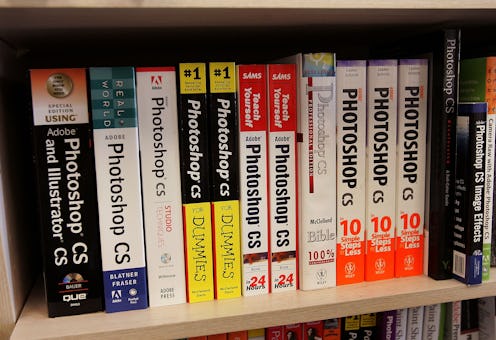Fashion
Seth Matlins is Your New Hero
When I first heard about the Truth in Advertising Act I thought, "It's about damn time!" In our digital age, misleading Photoshopping of advertisements and magazine spreads keeps getting worse, not better. This practice does a lot of harm by creating unrealistic standards of beauty for us (both women and men) to strive towards. So, who's behind the Truth in Advertising Act? Believe it or not, a former marketing executive named Seth Matlins.
Matlins, a former CEO for LiveNation, quit his job — which he describes in an interview with Fashionista as "pretty successful, pretty lucrative — once his oldest daughter turned three years old in 2010. As someone who knew the advertising world backwards and forwards, he began to realize how product marketing can deeply affect the individual. He tells Fashionista:
"At the risk sounding like a total daddy cliché, I was pretty wrapped around her finger," Matlins explains. "I began to look at the world and see the world through the eyes of this little girl, and I began to see all of the things that could get in the way of her being the happiest version of herself."
Soon after quitting LiveNation, Matlins and his wife founded the website Feel More Better. The mission statement reads:
We're trying to add new faces and new voices to a woman’s fight for the right to like herself. We want you to feel good enough about yourself that you can (quoting the great American artist Sol Lewitt) "learn to say 'fuck you' to the world once in a while. You have every right to. Just stop thinking, worrying, looking over your shoulder, wondering, doubting, fearing, hurting, hoping for some easy way out…grinding away at yourself. Stop it and just DO."
Pretty amazing stuff, right? I sure could have used a website with those goals in mind back when I was growing up. But Matlins understood that institutional change would also be necessary.
As Bustle's own Cherise Luter reported, Matlin's move from grassroots movement to politics was inspired "by British Parliament member Jo Swinson’s 2011 push to remove unrealistic advertisements in the U.K, including two L’Oréal ads featuring the airbrushed faces of Julia Roberts and Christy Turlington." The campaign, ultimately successful, led to Matlin's creation of the Truth in Advertising Act, in partnership with the Eating Disorders Coalition.
If enacted, the law would prevent the Photoshopping of advertisements, although not the retouching of editorial photospreads (i.e. Lena Dunham's Vogue spread would still be Photoshopped, but the Marc Jacobs ads wouldn't be). But legislating advertisements would still make a huge impact. For one, we'd be able to see the contrast between real bodies and Photoshopped bodies within the very pages of the magazines most guilty of digitally retouching images.
According to Matlin, the pervasive Photoshopping of advertisements leads to serious health concerns, mostly among young women. From his Fashionista interview:
[T]eenagers who suffer from poor body image are more likely to engage in a range of harmful behaviors, from bullying and risky sexual practices to eating disorders and cutting. The average American woman has 13 self-hating thoughts a day, per his research. In 2011, the American Medical Association even developed a Photoshop policy, and made a point to inform the media industry that excessive Photoshop was doing real harm to children and young adults.
Back when Swinson's story broke in 2011, Jezebel ran a piece called "Photoshop Legislation Won't Fix the Real Problem." The real problem, it seems, is the societal assumption that stick thin is most beautiful.
Of course, this is true. But earlier this year when Aerie began the "Aerie Real" campaign, I was relieved to see models with breasts larger than size B and creased stomachs when sitting down. Yes, they are still thin and traditionally beautiful. But anti-Photoshop legislation is a start. We need to show young girls that even the models and celebrities don't look the way slick advertisements make them look.
Matlin's Fashionista interview begins with a quote from his daughter, the one who inspired him to leave his job and start Feel More Better:
Two weeks ago, my daughter — apropos to nothing — looks up at me as I'm putting her to bed and she says, 'Daddy, do you think I'm ugly? My heart shatters into a thousand pieces, and I don't even know what to say.
This alone is reason enough to keep fighting for Photoshop regulation. If you're inspired to help Matlin's cause, please sign the Change.org petition.
